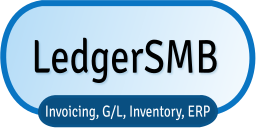Active support
Versions 1.12 and higher are under active development and are supported by the community. Planned end-of-life dates for current releases are:
- 1.13: Planned End-of-life date: 2027-10-04 (released 2025-10-04)
- 1.12: Planned End-of-life date: 2026-12-14 (released 2024-12-14)
End of life
If you're looking for help on how to use EOL-ed versions, please try mailing the users mailing list.
If you're looking for someone to create bugfixes, please check with one of the parties providing commercial support or for less urgent fixes LedgerSMB Issues
Version 1.11 has been declared end-of-life on 2025-10-03. The last release in the series is 1.11.28. No futher releases will be made by the community.
Version 1.10 has been declared end-of-life on 2024-10-08. The last release in the series is 1.10.38. No futher releases will be made by the community.
Version 1.9 has been declared end-of-life on 2023-09-24. The last release in the series is 1.9.30. No futher releases will be made by the community.
Version 1.8 has been declared end-of-life on 2022-09-04. The last release in the series is 1.8.31. No futher releases will be made by the community.
Version 1.7 has been declared end-of-life on 2022-10-04. The last release in the series is 1.7.41. No further releases will be made by the community.
Version 1.6 has been declared end-of-life on 2021-06-10. The last release in the series is 1.6.33. No further releases will be made by the community.
Version 1.5 has been declared end-of-life on 2019-12-23. The last release in the series is 1.5.30. No further releases will be made by the community.
Version 1.4 has been declared end-fo-life on 2017-09-16. The last release in the series is 1.4.42. No further releases will be made by the community.
Version 1.3 has been declared end-of-life on 2015-12-23. The last release in the series is 1.3.47. No further releases will be made by the community.
LedgerSMB versions 1.0, 1.1 and 1.2 won't be maintained any further due to the fact that there are some known security issues which can't be fixed.
